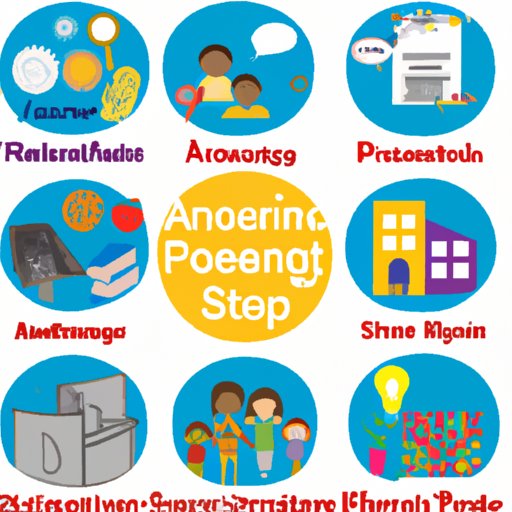Introduction
Afterschool programs provide a safe and engaging environment for children and youth outside of school hours. They are designed to support learning, help children develop social skills, and provide additional resources and activities that parents may not have access to. Starting an afterschool program is a great way to give back to your community and help children reach their full potential.
Overview of Afterschool Programs
According to a study conducted by the Afterschool Alliance, afterschool programs provide a variety of benefits to children and youth, including improved academic performance, higher graduation rates, better attendance, decreased disciplinary problems, and increased self-esteem. The study also found that afterschool programs can help reduce juvenile crime and drug abuse, as well as provide a safe environment for children and youth when their parents are at work.
Outline the Steps to Starting an Afterschool Program
Starting an afterschool program requires careful planning and preparation. Here are the steps you should take to get started:
Research Community Needs
Before you start planning your afterschool program, it is important to research the needs of your community. Talk to parents, teachers, students, and community leaders to determine what type of program would best serve the community. Consider the age range, interests, and abilities of the students who will participate in the program.
Develop a Plan
Once you have identified the needs of the community, you can begin to develop a plan for your afterschool program. Consider the goals of the program, the type of activities you will offer, the location of the program, and the schedule. It is also important to consider any safety or security measures that need to be taken.

Develop Budget and Secure Funding
Creating a budget for your afterschool program is essential. You will need to secure funding to cover the cost of supplies, staff, and other expenses. You can apply for grants from local foundations, seek donations from businesses and individuals, or look for other sources of funding such as state and federal grants.
Recruit Volunteers
Volunteers are essential to the success of any afterschool program. Reach out to local organizations, churches, and universities to find volunteers with the skills and experience necessary to lead activities and mentor students. Leverage social media to spread the word about your program and consider offering incentives to attract more volunteers.
Create a Curriculum
Designing an effective curriculum for your afterschool program is key. Determine the goals of the program and assess the available resources. Design activities that are engaging and age-appropriate, and evaluate progress regularly to ensure the program is meeting its objectives.
Promote the Program
Once you have developed your plan and secured funding, it is time to promote the program. Create flyers and use social media to spread the word. Reach out to local organizations and schools to let them know about your program and invite them to participate.

Compare Different Types of Afterschool Programs
There are many different types of afterschool programs available. School-age programs provide structured activities for children during non-school hours, such as tutoring and enrichment classes. Summer camps offer outdoor activities and educational experiences for children during summer months. Tutoring programs provide individualized instruction for children who need extra help in certain subjects.
Explain Funding and Resource Requirements for an Afterschool Program
Funding and resources are essential for any afterschool program. Grants and donations from local foundations and businesses can help cover the cost of supplies and staff. Local resources such as libraries and museums can provide free or low-cost materials and activities. State and federal funding may also be available to help cover the cost of the program.
Share Tips for Finding Volunteers for an Afterschool Program
Finding volunteers for your afterschool program is essential. Reach out to local organizations, churches, and universities to find people with the skills and experience necessary to lead activities and mentor students. Leverage social media to spread the word about your program and offer incentives such as gift cards or free meals to attract more volunteers.

Discuss Strategies for Developing Effective Curriculum for an Afterschool Program
Creating an effective curriculum for your afterschool program is key. Determine the goals of the program and assess the available resources. Design activities that are engaging and age-appropriate, and evaluate progress regularly to ensure the program is meeting its objectives. Additionally, involve parents and other members of the community to ensure the curriculum meets their needs.
Conclusion
Starting an afterschool program is a great way to give back to your community and help children reach their full potential. It requires careful planning and preparation, including researching community needs, developing a plan, securing funding, recruiting volunteers, creating a curriculum, and promoting the program. With the right resources and support, you can create an afterschool program that is engaging and effective.
(Note: Is this article not meeting your expectations? Do you have knowledge or insights to share? Unlock new opportunities and expand your reach by joining our authors team. Click Registration to join us and share your expertise with our readers.)
